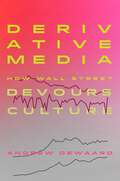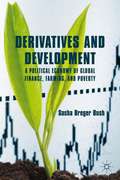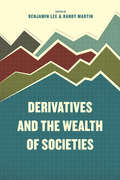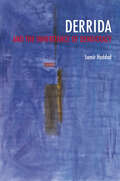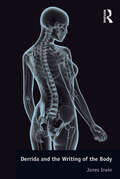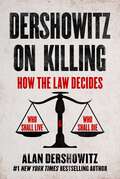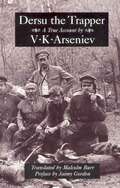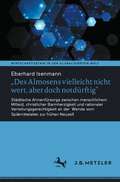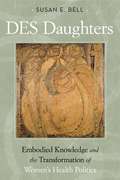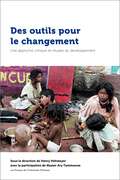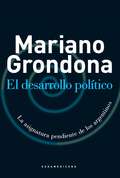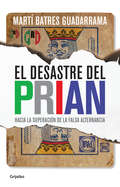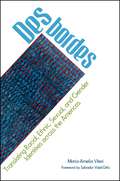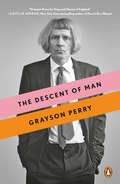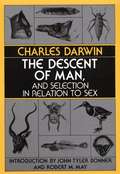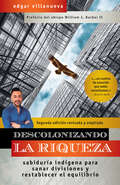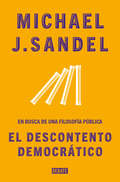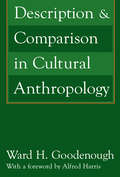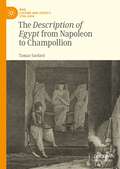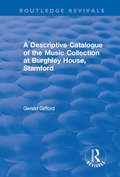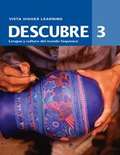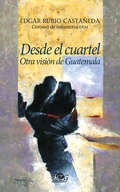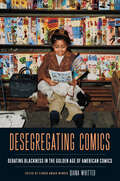- Table View
- List View
Derivative Media: How Wall Street Devours Culture
by Andrew deWaardA free ebook version of this title is available through Luminos, University of California Press's Open Access publishing program. Visit www.luminosoa.org to learn more. Sequels, reboots, franchises, and songs that remake old songs—does it feel like everything new in popular culture is just derivative of something old? Contrary to popular belief, the reason is not audiences or marketing, but Wall Street. In this book, Andrew deWaard shows how the financial sector is dismantling the creative capacity of cultural industries by upwardly redistributing wealth, consolidating corporate media, harming creative labor, and restricting our collective media culture. Moreover, financialization is transforming the very character of our mediascapes for branded transactions. Our media are increasingly shaped by the profit-extraction techniques of hedge funds, asset managers, venture capitalists, private equity firms, and derivatives traders. Illustrated with examples drawn from popular culture, Derivative Media offers readers the critical financial literacy necessary to understand the destructive financialization of film, television, and popular music—and provides a plan to reverse this dire threat to culture.
Derivatives and Development
by Sasha Breger BushBreger Bush argues that derivatives markets work in the development context as engines of inequality and instability, aggravating poverty among those they are purported to help and highlighting some of the dangers of neoliberal globalization for the poor.
Derivatives and the Wealth of Societies
by Benjamin Lee Randy MartinDerivatives were responsible for one of the worst financial meltdowns in history, one from which we have not yet fully recovered. However, they are likewise capable of generating some of the most incredible wealth we have ever seen. This book asks how we might ensure the latter while avoiding the former. Looking past the usual arguments for the regulation or abolition of derivative finance, it asks a more probing question: what kinds of social institutions and policies would we need to put in place to both avail ourselves of the derivative's wealth production and make sure that production benefits all of us? To answer that question, the contributors to this book draw upon their deep backgrounds in finance, social science, art, and the humanities to create a new way of understanding derivative finance that does justice to its social and cultural dimensions. They offer a two-pronged analysis. First, they develop a social understanding of the derivative that casts it in the light of anthropological concepts such as the gift, ritual, play, dividuality, and performativity. Second, they develop a derivative understanding of the social, using financial concepts such as risk, hedging, optionality, and arbitrage to uncover new dimensions of contemporary social reality. In doing so, they construct a necessary, renewed vision of derivative finance as a deeply embedded aspect not just of our economics but our culture.
Dermatology Atlas for Skin of Color
by Diane Jackson-Richards Amit G. PandyaThis atlas, containing more than 300 color photos, focuses on those dermatologic conditions that are most common in ethnic skin or skin of color. It includes succinct explanations of each disease process, describes clinical findings and presents key information on diagnosis and treatment. Individual chapters are devoted to pigmentary disorders, follicular disorders, hair and scalp disorders, eczemas, papulosquamous disorders, granulomatous disorders, connective tissue diseases, infectious diseases, scarring disorders, cutaneous neoplasms, photodermatoses and drug eruptions. The fact that this atlas covers skin disorders that affect patients of all ethnic backgrounds ensures that it will be of worldwide relevance. It will serve as a valuable reference for dermatologists and a range of other health care providers.
Derrida and the Inheritance of Democracy (Studies In Continental Thought Ser.)
by Samir HaddadDerrida and the Inheritance of Democracy provides a theoretically rich and accessible account of Derrida's political philosophy. Demonstrating the key role inheritance plays in Derrida's thinking, Samir Haddad develops a general theory of inheritance and shows how it is essential to democratic action. He transforms Derrida's well-known idea of "democracy to come" into active engagement with democratic traditions. Haddad focuses on issues such as hospitality, justice, normativity, violence, friendship, birth, and the nature of democracy as he reads these deeply political writings.
Derrida and the Writing of the Body
by Jones IrwinMichel Foucault refers to 1965-1970 as, in philosophical terms, 'the five brief, impassioned, jubilant, enigmatic years'. This book reinterprets Jacques Derrida's work from this period, most especially in L'Écriture et la Différence (Writing and Difference), and argues that a transformation takes place here which has been marginalized in readings of his work to date. Irwin follows with a look at how the 'grammatological opening' becomes crucial for Derrida's work in the 1970s and beyond, incorporating one of his last readings of embodiment from 2000. By drawing our attention to the politics of desire and sexuality, this groundbreaking book engages with the work of key continental theorists, including Artaud, Bataille, Nietzsche, Heidegger, Habermas and Cixous, whilst also examining Derrida's relationship with Plato and feminist theory. It will appeal to a wide range of readers within the social sciences and philosophy, particularly those with interests in gender and sexuality, social theory, continental thought, queer studies and literary theory.
Dershowitz on Killing: How the Law Decides Who Shall Live and Who Shall Die
by Alan DershowitzIn Dershowitz on Killing: How the Law Decides Who Shall Live and Who Shall Die, Alan Dershowitz—New York Times bestselling author and one of America&’s most respected legal scholars—examines the subjects of death, life, and the law. Alan Dershowitz has been called &“one of the most prominent and consistent defenders of civil liberties in America&” by Politico and &“the nation&’s most peripatetic civil liberties lawyer and one of its most distinguished defenders of individual rights&” by Newsweek. His legal career as a criminal defense lawyer has been deeply involved with death and life decisions.Dershowitz on Killing is a timely examination of issues and questions that are front and center in today&’s society. Employing a philosophical, moral, religious, and cultural lens to the legal aspects surrounding death and life, Dershowitz elucidates the role of government to determine who shall live and who shall die in declaring wars, ordering executions, authorizing deadly force, permitting or denying abortions, providing or mandating vaccines, controlling climate change, allowing or refusing asylum for endangered migrants, and other life and death rulings. He notes that when the government decides these choices, it is asked to do so by first determining whether a &“right&” is involved, because rights trump mere interest, just as constitutional restrictions trump legislative and executive actions. Dershowitz on Killing asserts that the rules governing death and life decisions should reflect the irreversibility of death. It is essential reading for anyone interested in or concerned about how these decisions are allocated among state and federal; executive, legislative, and judicial; private and governmental; religious and secular institutions—and how people in a democracy, through the power of the ballot, have the ultimate say in these critical decisions.
Dersu The Trapper (Recovered Classics Ser.)
by Jaimy Gordon V. K. Arseniev Malcolm BurrVladimir Klavdievich Arseniev (1872-1930) undertook twelve major scientific expeditions between 1902 and 1930 in the Siberian Far East, and authored some sixty works from the geographical, geological, botanical, and ethnographic data he amassed. Among these, Dersu the Trapper has earned a privileged place in Russian literature. In this Russian counterpart to The Journals of Lewis and Clark and the novels of James Fenimore Cooper, Arseniev combines the precise observations of a naturalist with an exciting narrative of real-life adventure. Arseniev describes three explorations in the Ussurian taiga along the Sea of Japan above Vladivostok, beginning with his first encounter of the solitary aboriginal hunter named Dersu, a member of the Gold tribe, who thereafter becomes his guide. Each expedition is beset with hardship and danger: through blizzard and flood and assorted deprivations, these two men forge an exceptional friendship in their mutual respect for the immense grandeur of the wilderness. But the bridges across language, race and culture also have limitations, and the incursion of civilization exacts its toll. Dersu the Trapper is at once a witnessing of Russia's last frontier and a poignant memoir of rare cross-cultural understanding. Originally published in 1941, this English translation is reprinted in its entirety now for the first time.
"Des Almosens vielleicht nicht wert, aber doch notdürftig": Städtische Armenfürsorge zwischen menschlichem Mitleid, christlicher Barmherzigkeit und rationaler Verteilungsgerechtigkeit an der Wende vom Spätmittelalter zur frühen Neuzeit (Wirtschaftsethik in der globalisierten Welt)
by Eberhard IsenmannArmut ist ein universales gesellschaftliches Problem. Die Armenfrage wird in diesem Band anhand sehr verschiedenartiger und zugleich eindringlicher Quellen auf den Ebenen von Religion, Recht, Wirtschaft, Sozialstruktur, obrigkeitlichem Verwaltungshandeln und ausgeprägter sozialpsychologischer Mentalitäten untersucht. Dies geschieht ferner in Verbindung mit vorgegebenen Lehren einer allgemeinen Ethik, der Moraltheologie und eines christlich geprägten Humanismus sowie mit Normen des kanonischen und römischen Rechts. An der Wende vom Spätmittelalter zur frühen Neuzeit mündet die herkömmliche individuelle und kirchliche Caritas in einigen deutschen und flandrischen Städten in einem epochalen Wandel angesichts der hohen Anzahl an Armen und Bettlern, der Ordnungsprobleme des Bettlerwesens, schließlich als unabweisbare Konsequenz von Bettelverboten insbesondere im Gefolge reformatorischer Strömungen in eine kommunal organisierte Armenfürsorge mit zukunftsweisenden Elementen einer modernen Sozialfürsorge.
DES Daughters: Embodied Knowledge, and the Transformation of Women's Health Politics
by Susan E. BellFrom the 1940s to the 1970s, millions of women were exposed prenatally to the synthetic estrogen DES, a "wonder drug" intended to prevent miscarriages. However, DES actually had damaging consequences for the women born from DES mothers. The "DES daughters" as they are known, were found to have a rare form of vaginal cancer or were infertile. They were also at risk for miscarriages, stillbirths, and ectopic pregnancies. In DES Daughters, Susan Bell recounts the experiences of this generation of "victims. " In moving, heartfelt narratives, she presents the voices of those women who developed cancer, those who were cancer-free but have concerns about becoming pregnant, and those who suffered other medical and/or reproductive difficulties. Bell examines the hierarchy of knowledge and power of scientists, doctors, and daughters, tracing the emergence of a feminist health movement. The "embodied knowledge" of these DES daughters prompted them to become advocates and form a social movement that challenged reproductive medical knowledge specifically, but also the politics of women's health in general. Bell's important book chronicles the history and future of these grassroots activists born out of illness, suffering, and uncertainty.
Des outils pour le changement: Une approche critique en études du développement (Études en développement international et mondialisation)
by Henry VeltmeyerLe monde se dirige-t-il vers une crise sans précédent où se juxtaposent difficultés économiques, sociales, écologiques et politiques ? C’est cette question à facettes multiples qu’examine un collectif de chercheurs de divers horizons. Premier constat : à moins de revoir le modèle de développement actuel et d’y apporter des mesures correctives, les perspectives d’avenir sont plutôt inquiétantes. Cette crise mondiale marquerait, selon ces chercheurs, le point culminant d’une longue période de politiques de développement qui ont en commun d’avoir engendré des bouleversements à travers le monde, notamment dans les pays en développement. Une approche plus proactive et critique aux études en développement international, ainsi qu’à la façon dont le développement s’élabore sur le terrain, s’avère donc essentielle. Publié en anglais d’abord, Des outils pour le changement. Une approche critique en études du développement est une référence incontournable pour le lectorat francophone. Ce recueil comprend 49 brefs modules dont chacun aborde les grands thèmes du développement. Il est destiné tout autant aux théoriciens qu’aux professeurs, étudiants et chercheurs qui s’intéressent à une approche critique en études du développement. Qualifié de réalisation remarquable lors de sa sortie en anglais, cet ouvrage permet de mesurer l’ampleur des études du développement en fonction d’une approche critique. Une conviction commune anime cet ouvrage : il est impératif de procéder à des changements qui favoriseront un progrès véritable et durable. Publié en français
DESARROLLO POLITICO, EL (EBOOK)
by Mariano GrondonaPor qué algunas naciones se han desarrollado y otras no? El desarrollo se dice de dos maneras. Es desarrollo económico en el caso de aquellas naciones que ofrecen a la mayoría de sus habitantes un alto nivel de vida. Es desarrollo político, o #democracia#, en el caso de aquellas naciones que aseguran a sus habitantes altos índices de estabilidad institucional, participación ciudadana y libertad de expresión. La forma concreta que adoptan las naciones políticamente desarrolladas es un régimen de partidos en el que dos o más fuerzas se alternan en el poder, bloquean el reeleccionismo ilimitado y, si bien compiten entre ellas por el favor del electorado, también logran diseñar políticas de Estado de largo plazo cuya continuidad está asegurada, sea cual fuere el partido en el poder gobernante. Por largo tiempo se pensó que el desarrollo económico debía preceder al desarrollo político, que la prosperidad económica tenía que anticiparse a la democracia. Al fracaso de este modelo lo sucedió el éxito que está obteniendo en nuestra región, a partir de los años ochenta, una fórmula inversa, según la cual el desarrollo político es la condición necesaria del desarrollo económico. No es esto lo que está ocurriendo ahora mismo en países vecinos como Chile, Uruguay y Brasil? No es esto lo que podría ocurrirnos a los argentinos? El desarrollo político es nuestra gran asignatura pendiente, sostiene Mariano Grondona en este libro. La maduración de una democracia pluralista y estable es la única vía, aunque sea una vía lenta y acumulativa, que nos conducirá a la plenitud como nación que tanto anhelamos.
El desastre del PRIAN
by Martí BatresEn este libro, Martí Batres -político y académico de larga trayectoria, actualmente dirigente de Morena- designa como PRIAN a la unión no declarada de dos partidos políticos, PRI y PAN, obstinados en presentarse ante el electorado como antagónicos. Con hondura crítica y datos concretos expone claramente cómo los proyectos de ambos son idénticos y no tienen más finalidad que propugnar y concretar las reformas estructurales de índole neoliberal. Sin embargo, apoyado en referencias estadísticas, sostiene que este propósito mancomunado ha hundido al país en el estancamiento y la pobreza. El desastre del PRIAN no se queda en la crítica: desarrolla propuestas concretas como la disminución del salario de la clase política; el impulso no a la gran empresa sino a la mediana, pequeña y micro; lucha contra la corrupción, recuperación salarial, diversificación de las exportaciones, práctica de una democracia participativa; así como otras medidas políticas, sociales y económicas. Sólo de esta forma, concluye el autor, podrá abandonarse el modelo del PRIAN y cambiar el rumbo de la nación.
Desbordes: Translating Racial, Ethnic, Sexual, and Gender Identities across the Americas (SUNY series, Genders in the Global South)
by María-Amelia ViteriMaría-Amelia Viteri explores the multiple unfixed meanings that the term "Latino" takes on as this category is reappropriated and translated by LGBT "Latinos" in Washington, DC, San Salvador, and Quito. Using an anthropology-based, interdisciplinary approach, she exposes the creative ways in which migrants—including herself—subvert traditional readings based on country of origin, skin color, language, and immigrant status. A critical look at the multiple ways migrants view what it means to be American, Latino, and/or queer provides fertile ground for theoretical, methodological, and political debates on the importance of a queer transnational and immigration framework when analyzing citizenship and belonging. Desbordes (un/doing, overflowing borders) ethnographically addresses the limits and constraints of current paradigms within which sexuality and gender have been commonly analyzed as they intersect with race, class, ethnicity, immigration status, and citizenship. This book uses the concept of "queerness" as an analytical tool to problematize the notion of a seamless relationship between identity and practice.
The Descent of Man
by Grayson PerryWhat does it mean to be male in the 21st Century? Award-winning artist Grayson Perry explores what masculinity is: from sex to power, from fashion to career prospects, and what it could become—with illustrations throughout.In this witty and necessary new book, artist Grayson Perry trains his keen eye on the world of men to ask, what sort of man would make the world a better place? What would happen if we rethought the macho, outdated version of manhood, and embraced a different ideal? In the current atmosphere of bullying, intolerance and misogyny, demonstrated in the recent Trump versus Clinton presidential campaign, The Descent of Man is a timely and essential addition to current conversations around gender. Apart from gaining vast new wardrobe options, the real benefit might be that a newly fitted masculinity will allow men to have better relationships—and that’s happiness, right? Grayson Perry admits he’s not immune from the stereotypes himself—yet his thoughts on everything from power to physical appearance, from emotions to a brand new Manifesto for Men, are shot through with honesty, tenderness, and the belief that, for everyone to benefit, updating masculinity has to be something men decide to do themselves. They have nothing to lose but their hang-ups.
The Descent of Man, and Selection In Relation to Sex
by Charles Darwin John Tyler Bonner Robert M. MayIn the current resurgence of interest in the biological basis of animal behavior and social organization, the ideas and questions pursued by Charles Darwin remain fresh and insightful. This is especially true of The Descent of Man and Selection in Relation to Sex, Darwin's second most important work. This edition is a facsimile reprint of the first printing of the first edition (1871), not previously available in paperback. The work is divided into two parts. Part One marshals behavioral and morphological evidence to argue that humans evolved from other animals. Darwin shoes that human mental and emotional capacities, far from making human beings unique, are evidence of an animal origin and evolutionary development. Part Two is an extended discussion of the differences between the sexes of many species and how they arose as a result of selection. Here Darwin lays the foundation for much contemporary research by arguing that many characteristics of animals have evolved not in response to the selective pressures exerted by their physical and biological environment, but rather to confer an advantage in sexual competition. These two themes are drawn together in two final chapters on the role of sexual selection in humans. In their Introduction, Professors Bonner and May discuss the place of The Descent in its own time and relation to current work in biology and other disciplines.
Descolonizando la riqueza
by null Edgar VillanuevaLa verdad ineludible es que el racismo sistémico y las estructuras coloniales son principios fundamentales de nuestras economías.Nuestra industria filantrópica de mil millones de dólares es un ejemplo flagrante. ¿Cómo, pues, cambiamos la filantropía y otras industrias hacia la reconciliación social y la sanación si sus premisas básicas son la explotación, la extracción y el control? En Descolonizar la riqueza, Edgar Villanueva mira más allá de la glamurosa y altruista fachada de la filantropía y nos introduce en sus sombras: supremacía blanca, complejo de salvador y opresión interiorizada. Después, basándose en tradiciones nativas, Edgar empodera a individuos e instituciones para comenzar a reparar los daños mediante sus siete pasos para la sanación. En esta segunda edición, añade inspiradores ejemplos de personas que utilizan sus recursos para descolonizar el sector del entretenimiento, museos, bibliotecas, la propiedad de tierras y mucho más. Todos podemos ser personas y líderes sanadores para restaurar el equilibrio, y todos tenemos que hacer nuestra parte. ¿Estás dispuesto?
El descontento democrático: En busca de una filosofía pública
by Michael J. SandelEl profesor de filosofía más famoso del mundo analiza los peligros a los que se enfrenta la democracia. «Una profunda contribución anuestra comprensión de los descontentos actuales».The Wall Street Journal La división, la crispación y la polarización han dado un vuelco al escenario político internacional. El murmullo de descontento que comenzó en los años noventa ha llevado a ciertos sectores de la sociedad a manifestar una clara animadversión hacia el proyecto globalizador de las élites. Gobernantes y ciudadanía parecen preferir el libre mercado en lugar de una democracia saludable. Conceptos como «libertad» o «civismo» han dejado de generar consenso y se han convertido más que nunca en armas arrojadizas entre adversarios electorales. Mientras, aumentan las desigualdades sociales, la injusticia racial y el hiperpartidismo, y las fronteras nacionales pierden su relevancia económica e identitaria. En esta nueva edición de El descontento democrático, publicado por primera vez en 1996 y actualizado a los nuevos tiempos, Michael J. Sandel explora de un modo certero e iluminador las causas de la profunda decepción que se ha apoderado de la vida pública en las democracias occidentales. A través del caso de Estados Unidos, nos proporciona herramientas para comprender cómo en tiempos de guerras culturales, donde cada vez es más difícil que surjan movimientos reformistas de amplia base social, nuestra tradición cívica puede ayudarnos a imaginar una alternativa al sistema neoliberal y tecnocrático en que estamos instalados, donde la identidad y los ideales comunes están cada vez más devaluados. La crítica ha dicho:«Provocador. Defiende que las democracias modernas no podrán sostenerse a menos que encuentren la manera de hacer frente a la economía global y, al mismo tiempo, dar expresión a las identidades distintivas de sus pueblos».The New York Times «Una profunda crítica del liberalismo estadounidense que, a diferencia de otroslibros sobre el tema, busca su restauración como ética política. Un libro repleto de ideas valiosas».Kirkus Reviews «Entre los méritos que lo hacen único están la admirable combinación de análisis conceptual e investigación histórica, y la impresión de una mente genuinamente reflexiva y un espíritu generoso».Canadian Journal of Philosophy «Una de las obras más poderosas de filosofía pública aparecidas en los últimos años. Un diagnóstico brillante».U.S. News & World Report«Un libro importante sobre el significado de la libertad. El análisis es soberbio».The Washington Post Book World «Pocos libros son tan relevantes un cuarto de siglo después de su aparición como cuando se publicaron, pero Michael Sandel ha conseguido que este clásico lo sea aún más».Samuel Moyn «Profundamente perspicaz, nunca ha sido más oportuno que hoy. Una lectura esencial —y esperanzadora— para quienes se preguntan si nuestro experimento democrático sobrevivirá en el siglo XXI».Greta R. Krippner
Description and Comparison in Cultural Anthropology (Lewis Henry Morgan Lectures)
by Alfred HarrisThe Lewis Henry Morgan Lectures are intended to commemorate both the man and his work the latter being viewed as having provided an admirably broad and substantial base for anthropologists of later generations to build upon, as they have done and continue to do in diverse ways.Professor Goodenough's work, in the past and in this book particularly, emphasizes the vitality and fruitfulness of Morgan's contributions. Not only do these lectures carry forward Morgan's interests in kinship; they reflect as well his concern for comparative studies undertaken with the aim of ultimately understanding mankind. Moreover, Professor Goodenough has elucidated recent developments in the collection, analysis, and presentation of cultural data in ways that make it easier for all of us to see how his methods (in themselves specialized) can broaden and deepen our understanding of culture and of man.Morgan, himself a pioneer in method, would surely have been an attentive auditor-and discussant-at Professor Goodenough's Lectures, and in his seminars and the less formal events in which he participated while at Rochester, and to which he contributed so much. This volume is an expanded version of the Lewis Henry Morgan Lectures delivered at the University of Rochester, April 2 to 11, 1968.Alfred Harris was a professor emeritus of anthropology at the University of Rochester. He served as the chair of the anthropology from 1964-1971 and he was well known for being the editor of the Lewis Henry Morgan Lectures.
The Description of Egypt from Napoleon to Champollion (War, Culture and Society, 1750–1850)
by Tamar SarfattiThis book is the first study in English of the multi-volume set of texts and engravings of the Description of Egypt, a work produced following the three-year-long Egyptian campaign led by Napoleon Bonaparte in 1798. The book challenges the conventional and rather reductive interpretation of the Description that followed Edward Said's Orientalism, as a summation of an orientalist colonial project. It re-centres the Description in the much more complex and dynamic political and intellectual world of France of the late eighteenth and early nineteenth century and its colonial aspirations. It follows closely the notes, texts, and illustrations of the contributors to the work, the majority of whom were graduates of the first years of the Polytechnic school in Paris, and the well-documented editing process that continued for almost thirty years, in which France moved from Revolution to Empire and Restoration. It shows the ways in which scholarly traditions and newly acquired skills interplay with Enlightenment texts, contemporary politics, and received ideas about antiquity, and how these were reinterpreted and modified – in texts and illustrations – through the encounter with the physical and social worlds of Ottoman Egypt. Using the rich repository of the Description of Egypt the book demonstrates the contribution of antiquarian methods of research to the emerging disciplines of the social sciences.
A Descriptive Catalogue of the Music Collection at Burghley House, Stamford (Routledge Revivals)
by Gerald GiffordThis title was first published in 2002: Burghley House, Stamford, was built between 1555 and 1587 for William Cecil, Lord Burghley, the Lord High Treasurer to Queen Elizabeth I. The library there contains an extensive collection of manuscript and printed music dating from about 1650 to 1850, substantially formed during the latter part of the 18th century by the Ninth Earl of Exeter. The collection is given particular significance by the inclusion of several rare and in some cases apparently unique volumes. This catalogue examines the Burghley House music collection in the light of contemporary documentary evidence. The opening section describes the people who added to the collection and their musical enthusiasms. This approach brings the collection to life and also enables us to appreciate emergent trends in British music history of the period. With each entry fully described and the printed music referenced to RISM or CPM, this catalogue should form a valuable reference source for all scholars of British music from the 17th to the 19th century.
Desde el cuartel: Otra visión de Guatemala
by Edgar Rubio CastañedaSoy un coronel del Ejército de Guatemala con 25 años de servicio en esa institución que me da de comer a mí y a mi familia. Soy fiel admirador del coronel Jacobo Arbenz Guzmán, el Soldado del Pueblo, principal ideólogo de la Revolución de Octubre de 1944, presidente de Guatemala de 1951 a 1954, traicionado por algunos oficiales de la cúpula militar de aquellos años, derrocado por orden del presidente estadounidense Dwight Eisenhower (republicano), por medio del Departamento de Estado, la Agencia Central de Inteligencia (cia, por sus siglas en inglés); la embajada estadounidense acreditada en Guatemala, tres gobiernos de países supuestamente amigos (Honduras, Nicaragua y República Dominicana), la oligarquía terrateniente y la Iglesia católica. Enterrado en nuestra historia política y educativa, porque la oligarquía aún no se recupera sicológicamente del profundo impacto de sus políticas sociales.
Desegregating Comics: Debating Blackness in the Golden Age of American Comics
by Qiana WhittedSome comics fans view the industry’s Golden Age (1930s-1950s) as a challenging time when it comes to representations of race, an era when the few Black characters appeared as brutal savages, devious witch doctors, or unintelligible minstrels. Yet the true portrait is more complex and reveals that even as caricatures predominated, some Golden Age comics creators offered more progressive and nuanced depictions of Black people. Desegregating Comics assembles a team of leading scholars to explore how debates about the representation of Blackness shaped both the production and reception of Golden Age comics. Some essays showcase rare titles like Negro Romance and consider the formal innovations introduced by Black comics creators like Matt Baker and Alvin Hollingsworth, while others examine the treatment of race in the work of such canonical cartoonists as George Herriman and Will Eisner. The collection also investigates how Black fans read and loved comics, but implored publishers to stop including hurtful stereotypes. As this book shows, Golden Age comics artists, writers, editors, distributors, and readers engaged in heated negotiations over how Blackness should be portrayed, and the outcomes of those debates continue to shape popular culture today.
